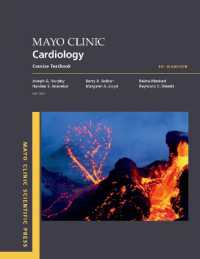- ホーム
- > 洋書
- > 英文書
- > Politics / International Relations
Full Description
A myth-busting investigation of small donors: who they are, how they spend their money, and whose campaigns actually benefit from their donations.
Many political reformers argue that more robust small donor participation in US campaigns would reduce the influence of the wealthiest Americans and improve political responsiveness to ordinary citizens. Drawing on extensive data, including surveys and campaign records, Zachary Albert and Raymond J. La Raja largely dispel this myth, offering the first comprehensive portrait to date of small donors in US elections.
Although small donor contributions to high-profile, national races have increased markedly since 2018, the US campaign finance system allows for even larger sums of money from Super PACs and other independent spending groups. Moreover, small donors are mostly similar to their larger contributor counterparts: both are socioeconomically advantaged, strongly partisan, ideologically extreme, and distinct from non-donors. Small donors can also be impulsive: they tend to give mostly to high-profile candidates on the ideological extremes, empowering media celebrities and norm-breakers rather than consensus-builders, and they underinvest in competitive and down-ballot races. Importantly, the candidates who rely most heavily on small donor support are not necessarily better legislators or representatives.
Yet, the story is not entirely bleak. Small donors bring energy and resources, especially for challengers and outsider candidates. The book shows how reforms could channel this energy more productively—by strengthening political parties, emphasizing local representation, and creating systems that broaden participation beyond the most ideological citizens.
Timely, accessible, and grounded in data, Small Donors in US Politics reveals both the promise and the peril of small donor politics—and what it will take to make money in politics serve democracy, not undermine it.
Contents
List of Illustrations
Introduction
Chapter 1. Trends for Small Donors in US Politics
Chapter 2. Who Are Small Donors?
Chapter 3. Who Benefits from Small Donors?
Chapter 4. Are Small-Donor Fundraisers Better Legislators?
Chapter 5. Institutional Factors Affecting Small Donations
Conclusion. The Promise and Perils of Small-Donor Democracy
Appendix A: Categorizing Small and Large Donors
Appendix B: Validity of Catalist Measures
Appendix C: Regression Analyses Predicting Small and Large-Donor Status
Appendix D: Regression Analyses Predicting Small-Donor Fundraising by Congressional Candidates
Appendix E: Regression Analyses Predicting Effects of Donor Opinion on MC Roll Call Votes
Appendix F: Regression Analyses Predicting the Share of State Legislative Funds Contributed by Small Donors
Notes
Bibliography
Index








